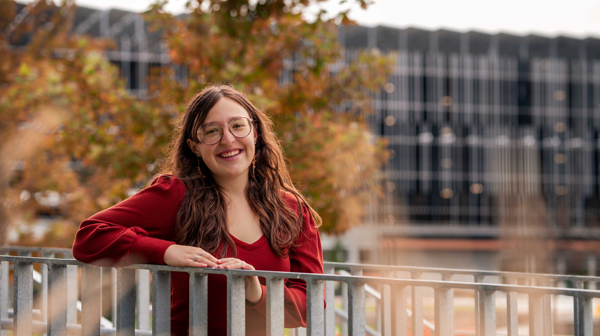

Students should actually give getting involved a shot because it can give you more opportunities to build these solid foundations, friendships, and relationships."
Fourth-year Psychology student Amanda Lopresti remembers how she felt as a first-year student at the University of Guelph-Humber: eager to make the most of her time but still a bit intimidated by her new University environment.
Though the transition from high school to University can be daunting, Lopresti still decided in that first year to volunteer as a research assistant for Psychology Assistant Program Head Dr. Adam Sandford.
Looking back, she couldn’t be happier that she did.
That research opportunity started the ball rolling on four years of involvement in campus life for Lopresti, who went on to get involved in the First Year Experience program, work as a Research Support Peer, volunteer at Science Rendezvous, and work a variety of roles within the Psych Society before being appointed President of the society for her final year of study at UofGH.
“I’m so happy that I put myself out there in my first year,” Lopresti says. “I kept telling myself that I didn’t want to leave getting involved to my third or fourth year.
“I really am proud that I put myself out there right away.”
What would you tell students about Psych Society?
Psych Society is pretty much open to all years. We run both academic events and social events. We want to bring out the fun side of Psychology as well as the academic side. We do workshops, events, and we also have Common Time, which is a weekly session where a new topic is discussed every week. Some examples would be how to get your application ready for graduate school or GRE preparation. We just do something new every week that would benefit Psychology students and help them academically and socially.
What inspired you to get involved with the society?
I want to communicate with other people in my program that share the same interests as me and passion for Psychology. I really wanted to be that voice for the Psychology program and I really wanted to engage the program as much as possible. I wanted to bring out not just the learning aspect and knowledge of what Psychology and mental health is, but at the same time, bring out a social and engaging aspect and bring everyone together, since we all share that common interest, which is Psychology.
What do you think you’ve gotten out of your participation?
I’ve learned a lot of skills. I’ve learned definitely how to communicate in a team setting and I’ve learned organizational and time management skills as well. I’ve learned how to prioritize my time. I would say I’ve become more confident in myself and my capabilities – not just with this team, but also more confident in other settings as well.
Also, it’s honestly a really nice and genuine environment where you can meet a lot of people and where you can build these strong friendships. I feel like me being the relator – being able to relate to other people – that’s something that’s really important to me and I found that in Psych Society.
So that’s something I feel like students should understand and should actually give getting involved a shot because it can give you more opportunities to build these solid foundations, friendships, and relationships.
What advice would you give to first-year students?
I would say to have courage. It does take a lot of courage to put yourself out there, especially in a new environment. I would encourage students to have the courage to put yourself out there and – it sounds cheesy, but to not give up when things are not going your way.
You have so many opportunities and it’s worth it to take the shot, to put yourself out there and to be yourself. Because you will be accepted. It may not feel like it at times, but you will be accepted out there.
I would also encourage them to build relationships. You don’t know where those relationships can take you.







